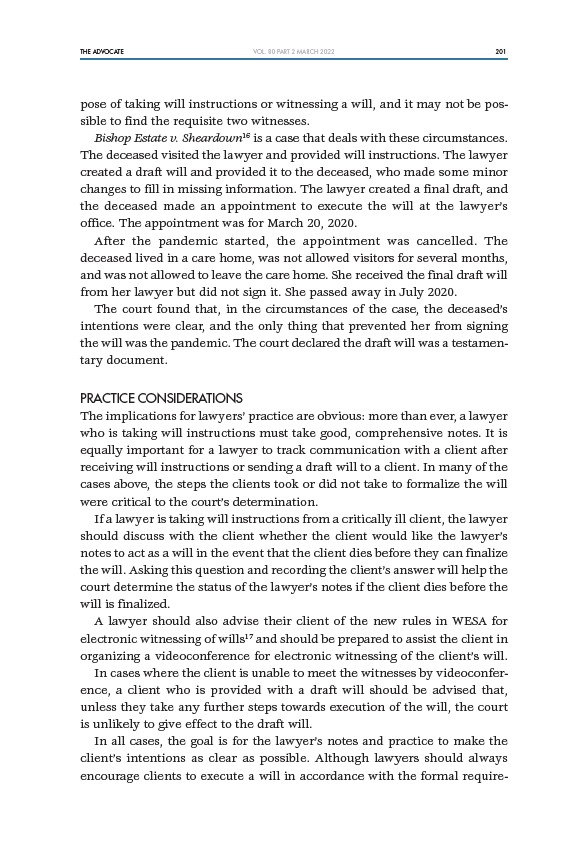
THE ADVOCATE 201
VOL. 80 PART 2 MARCH 2022
pose of taking will instructions or witnessing a will, and it may not be possible
to find the requisite two witnesses.
Bishop Estate v. Sheardown16 is a case that deals with these circumstances.
The deceased visited the lawyer and provided will instructions. The lawyer
created a draft will and provided it to the deceased, who made some minor
changes to fill in missing information. The lawyer created a final draft, and
the deceased made an appointment to execute the will at the lawyer’s
office. The appointment was for March 20, 2020.
After the pandemic started, the appointment was cancelled. The
deceased lived in a care home, was not allowed visitors for several months,
and was not allowed to leave the care home. She received the final draft will
from her lawyer but did not sign it. She passed away in July 2020.
The court found that, in the circumstances of the case, the deceased’s
intentions were clear, and the only thing that prevented her from signing
the will was the pandemic. The court declared the draft will was a testamentary
document.
PRACTICE CONSIDERATIONS
The implications for lawyers’ practice are obvious: more than ever, a lawyer
who is taking will instructions must take good, comprehensive notes. It is
equally important for a lawyer to track communication with a client after
receiving will instructions or sending a draft will to a client. In many of the
cases above, the steps the clients took or did not take to formalize the will
were critical to the court’s determination.
If a lawyer is taking will instructions from a critically ill client, the lawyer
should discuss with the client whether the client would like the lawyer’s
notes to act as a will in the event that the client dies before they can finalize
the will. Asking this question and recording the client’s answer will help the
court determine the status of the lawyer’s notes if the client dies before the
will is finalized.
A lawyer should also advise their client of the new rules in WESA for
electronic witnessing of wills17 and should be prepared to assist the client in
organizing a videoconference for electronic witnessing of the client’s will.
In cases where the client is unable to meet the witnesses by videoconference,
a client who is provided with a draft will should be advised that,
unless they take any further steps towards execution of the will, the court
is unlikely to give effect to the draft will.
In all cases, the goal is for the lawyer’s notes and practice to make the
client’s intentions as clear as possible. Although lawyers should always
encourage clients to execute a will in accordance with the formal require-